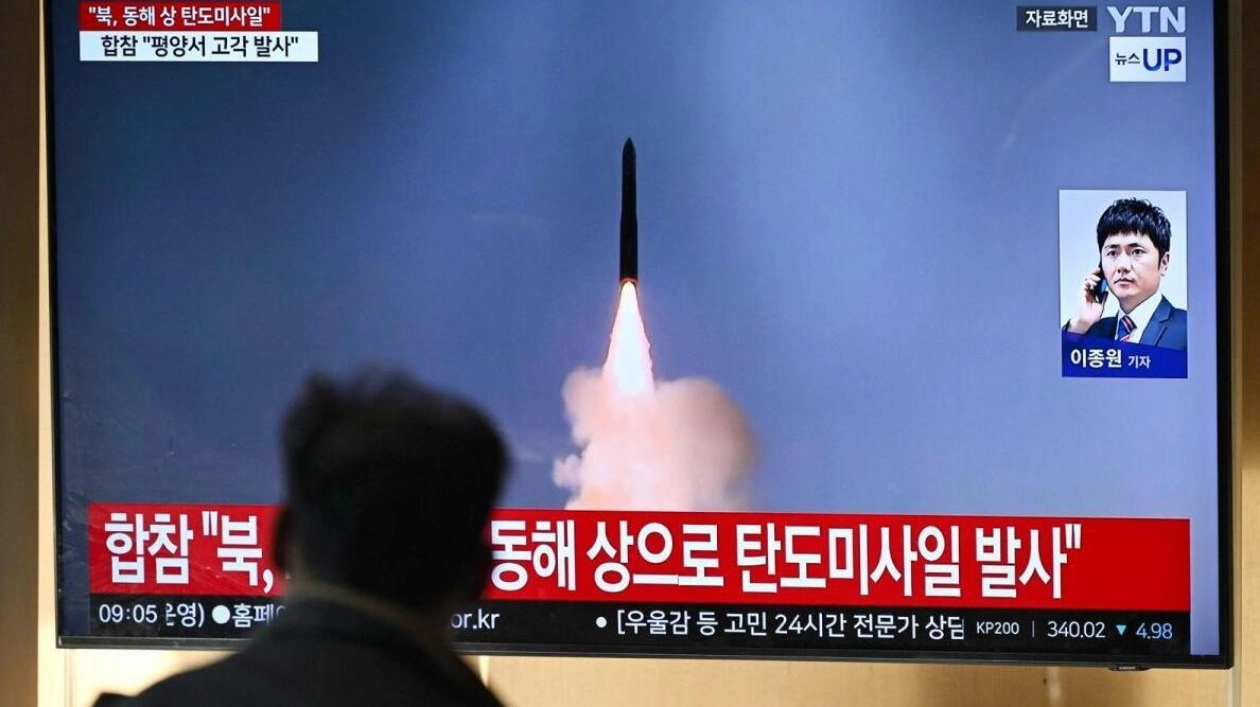A man observes a television screen displaying a news broadcast featuring archival footage of a North Korean missile test at a train station in Seoul on October 31, 2024. – AFP
North Korea carried out what seemed to be its longest-ever intercontinental ballistic missile test on Thursday, as South Korea cautioned that Pyongyang might seek missile technology from Russia in exchange for deploying troops to aid in the war in Ukraine. The missile was launched on a steeply lofted trajectory from an area near the North's capital and landed approximately 300km west of Japan's Hokkaido, marking the North's longest ICBM flight time to date. This display of military capability by Pyongyang occurred just a day after Seoul detected signs that the North might test-launch an ICBM or conduct a seventh nuclear test around the US presidential election on Tuesday, aiming to highlight its expanding military strength.
The launch was met with immediate condemnation from South Korea, Japan, and the US, especially given the growing international concern over North Korea allegedly sending thousands of troops to Russia to support its war in Ukraine. South Korea's Joint Chiefs of Staff stated, "It is believed the North Korea ballistic missile is a long-range ballistic missile fired at a high angle." Initial analyses suggest the possible use of a newly developed solid-fuel booster. According to South Korea and Japan, the missile had a flight time of 87 minutes, surpassing the 73 minutes recorded during the last ICBM test in December 2023. The Japanese government reported that the missile reached an altitude of 7,000km and flew a distance of 1,000 km, classifying it as an ICBM-class missile. A US official confirmed to Reuters that the missile was indeed an ICBM.
The so-called lofted trajectory, where a projectile is launched at a sharply raised angle, is designed to test its thrust and stability over shorter distances compared to its intended range, partly for safety reasons and to avoid political repercussions of sending a missile far into the Pacific. The last ICBM tested in December, known as the Hwasong-18, powered by solid propellant and launched from a road-based platform, was also fired at a high angle, resulting in a flight time that could potentially translate to a range of 15,000km on a normal trajectory, putting anywhere in the mainland United States within reach.
The launch followed intense international criticism over North Korea's reported deployment of 11,000 troops to Russia, with 3,000 positioned near the western frontlines with Ukraine. Neither Moscow nor Pyongyang has acknowledged the deployment directly, but Russia's UN Ambassador Vassily Nebenzia questioned why allies like North Korea could not assist Moscow in its war against Ukraine, given that Western countries claim the right to support Kyiv. US Secretary of Defense Lloyd Austin and his South Korean counterpart Kim Yong-hyun denounced the troop deployment during a meeting in Washington, just hours before the North Korean missile launch. Austin warned that North Korea's decision to align its troops with the Russians could prolong the already 2-1/2 year Ukraine conflict and involve other nations.
South Korea views the deployment as a direct threat to its security, as the North would gain crucial combat experience in modern warfare and is likely to be rewarded by Moscow with "technology transfers" in areas such as tactical nuclear weapons, ICBMs, ballistic missile submarines, and military reconnaissance satellites. Shin Seung-ki, head of research on North Korea's military at the state-run Korea Institute for Defense Analyses, suggested that the longer flight time, indicating stronger thrust, might be due to improved performance of the booster, possibly with Russian assistance. "North Korea will want to continue receiving such help, as it saves time and costs while enhancing performance and stability of weapons systems," he said. Facing pressure over its ties with Russia, North Korea's intention may be to demonstrate its resilience, respond to strength with strength, and potentially influence the US presidential election, Shin added.
Source link: https://www.khaleejtimes.com






